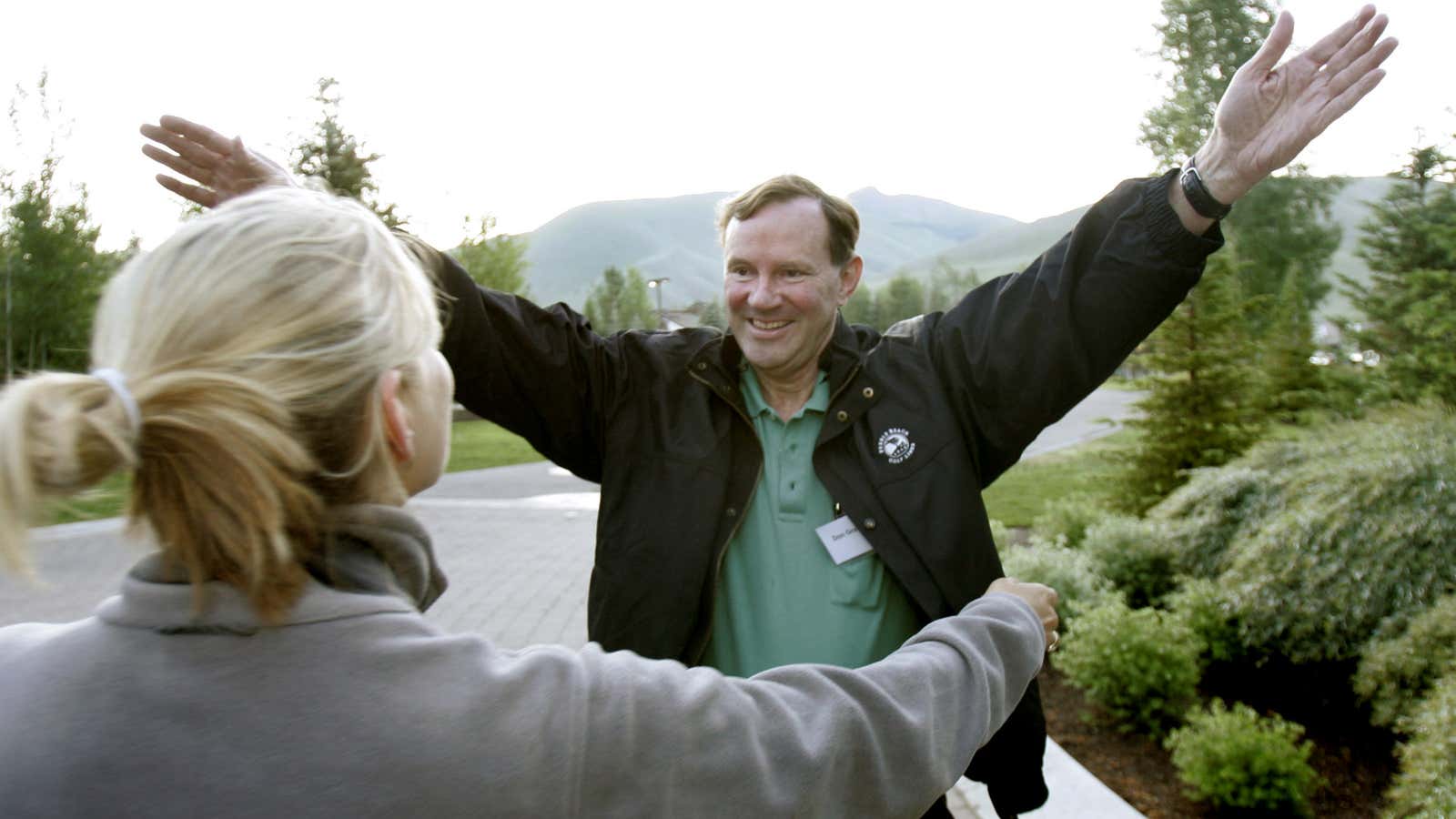There’s a lot Jeff Bezos needs to change about the way the Washington Post works. He’s pledged to keep the current publisher and editor in place, and many people are rightly skeptical on whether that’s a sound strategy.
There’s another promise, though, that should raise more concern. In a letter to employees, Bezos says, “I won’t be leading The Washington Post day-to-day.”
But let’s not forget what the Grahams got right. And no, it’s not just about Watergate. I worked at the Washington Post from 2003 to 2006, and count myself among its vast diaspora—“Posties”—whose outlook on journalism and, arguably, the world was transformed by toiling in one of the industry’s most venerable newsrooms under Donald Graham, of whom Bezos says, “I do not know a finer man.”
I largely agree but hesitate to pile on because Don, a former journalist and cop, himself concedes there was no end in sight to the losses. Yesterday, he invoked his mother’s words: “…to be a great newspaper you have to be profitable.” This move is about saving face and saving the newspaper.
Still, the Grahams set a tone for a newsroom that’s like no other I’ve ever worked in, precisely because they were so involved. Their touch is not unique to newspapers, but unfortunately is unique in newspapers. It was textbook good management. The most memorable interactions I had with Don had little to do with journalism and everything to do with the kind of boss he is, the kind of loyalty he earned, the kind of company he ran. Three examples that come to mind:
1) He sent reporters handwritten notes, known as “Don-grams,” when he loved a story, calling out everything from anecdotal leads to details about a homecoming queen’s dress. I’ve saved those notes along with the physical copies of the papers in which the stories ran. Praise was plentiful at the Post, as was time to work on good stories.
2) When my daughter was born, Don sent flowers, a teddy bear and a congratulatory letter. I was uncertain of whether I’d go back to work after maternity leave and I think Don (and the many supervisors between us) sensed this. His gesture (and more so that it was him, the chairman and CEO) went a long way in making me see the Washington Post as a flexible, family-friendly place. Indeed, the paper ended up creating a position for me to work part time.
3) I was applying for a different job within the Post when I ran into Don in the elevator. He asked how I was and I told him I was on my way to the interview with the hiring manager. “But there’s a preferred candidate,” I lamented.
“Make yourself the preferred candidate,” he told me. “You want to be in India, get to India.”
I didn’t end up getting the position, but the Post granted me a leave of absence to take another job in India—and assured me I’d be employed when I came back to the US. That’s the kind of company it was.
It’s also the kind of company it still can be. There is no reason Jeff Bezos—and a whole lot of other leaders in journalism right now—cannot employ the tactics that distinguished the Post from its competitors: Be nice places to work that foster truly excellent, hard-hitting journalism. Two more ways the Post was great once upon a time: It paid well (relatively) and employed a diverse newsroom.
Where the Post failed is where so much of journalism failed—to see every outlet as competition, to recognize the value of its own brand globally, to integrate digital operations from the outset. It grew too complacent and didn’t embrace nor rush to change. In the face of the internet, much of the Post’s failure was inevitable, but it is not irreversible.
When I was in college in the mid-1990s, one of my mentors made me take a week’s worth of the New York Times and Washington Post and compare their front pages. Day after day, it was the latter that had the unique angle or “take” on a story, while the former tended to play it straight. Oddly, it is that same breaking news analysis the Post employed back then that digital journalism thrives on today.
Now, my Facebook feed is filled with former colleagues recounting their shock (and some, their horror) at the Bezos purchase. Others are writing about Don Graham as though he’s dead. (In the words of the New Yorker’s David Remnick, he almost is; “Graham’s heart is broken.”)
It doesn’t have to be this way. Bezos would do well to study the grace, compassion, and hands-on nature with which the Graham family ran its newsroom and integrate their best practices. The new “Don-grams” might morph into Amazon gift cards—but a culture of rewarding employees with pay and praise (all the while demanding steady scoops and investigations that bring down a president) is hardly something that has to leave with the Grahams. Indeed, the future of journalism—not just newspapers—depends on it.
